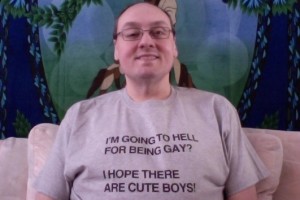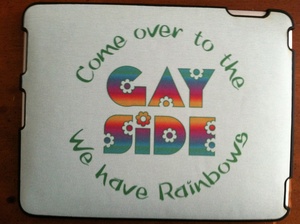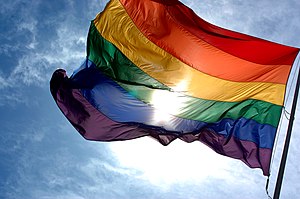While talking with Stephen Bradford Long over at his blog, he expressed an interest in hearing my story about how I left Christianity and came to a Pagan path. I realized that while I’ve occasionally talked about it, I’ve never fully written out the story or tried to capture the various factors that contributed in a single post. I thought it might be good to do exactly that.
As I think is true for so many queer people, my journey out of Christianity started with coming to terms with my sexuality, a topic that I have covered quite extensively elsewhere. While I left my church and Christianity in 1998, the first step in that direction occurred in April 1996, when I decided to quit trying to deny or change the fact that I was attracted to other men — a decision I literally made for the sake of my own survival at the time.
Like so many young evangelical people, at the time I came out, my circle of friends almost exclusively consisted of other Christians, most of whom had the same evangelical leanings that I did. And while a few of my friends were probably sympathetic to LGBT people and possibly even affirming or on their way to being affirming, I felt that I needed to find new friends to support and affirm me as well. So a month before graduation, I started reaching out to another group on my college campus, a volunteer group dedicated to helping students with computer problems. It happened that a lot of people involved with this organization happened to be Pagan, into New Age spirituality, and Pagan-friendly. They were also very welcoming and encouraging of me. Some of them even ran a Telnet-based BBS, which I become involved with (and eventually the main programmer for) when I managed to get Internet access at home.
So I moved back to the rural part of Pennsylvania that my parents lived with (and I lived with them for most of the time until I was 31, moving into my own place for roughly two years starting in 1998). My new friends online and back on the college campus (many of them graduated after me) became my lifeline for the first several years I was stuck in rural conservative-land, having to hide myself. I often made many trips back to school during the next two years.
During this time, I also found myself re-examining my faith. After all, here were these friends who were helping to keep me from feeling completely lost and isolated, and I had been taught to believe that they were going to hell and deserved it. I could not reconcile these two things. Surely my friends deserved better than this. So i started to re-evaluate more in my faith than just what I believed about my own sexuality.
At this time, I was also starting to deal with a lot of emotional turmoil — repressing my sexual feelings as well as going through the cycle of guilt and shame when I gave in and allowed myself to find sexual release by myself messed me up — and lingering doubt and guilt over my sexuality. In 1998, I met someone through a friend and we had a complicated and less than ideal relationship. To be blunt, it wasn’t really a healthy relationship and that was mostly my fault.
The relationship ended abruptly and painfully when i made some hurtful choices, costing me my first relationship and the friendship of the person who introduced us in the first place. It’s perfectly understandable, mind you. I hurt them deeply and it’s one of the few things in my life that I will unequivocally state that I regret.
This caused another huge wave of guilt and shame — a spiral of it no less. Partly because of the hurtful choices I had made and partly because I was still in a purity culture mentality at the time. Sure I had accepted that it was okay to be gay at the time, but I still had this notion that I should save myself for that one person I would spend my life with. Like so many people, I foolishly had believed that my first boyfriend would be the one I would spend my life with and had had sex with him. This meant that I felt like a failure, because now that wasn’t going to happen. I had “given myself away” to the wrong person. And what’s worse, it was all my fault that we weren’t together anymore.
Eventually, I realized I couldn’t go on living with all this guilt and shame and keep spiraling. I realized I was headed to that same dark place I had come out of the closet in order to escape from back in 1996. So it was time for another change.
I don’t rightfully remember if I actually intended to leave Christianity in November of 1998, when I asked one of my online Wiccan friends what book she would recommend I read to learn more about her beliefs. I just knew that I asked her and she recommended that I read Scott Cunningham’s “Wicca: A Guide for the Solitary Practitioner.” So I bought it and started reading it. Then I devoured it. Figuratively speaking.
The book a balm to my soul. Here was a religion that told me that I was okay. It told me that I could and should improve myself as a person, but it ultimately believed that it was possible for me to improve and become a better person because I had it in me. Compared to a faith that essentially told me that I had to try, but was guaranteed to fail and would have to grovel for mercy, it was a thing of beauty.
And Cunningham’s description of energy and magic spoke to me on a deep, visceral level. I always felt like such things existed, but was not permitted to truly believe in them in a faith that insisted such things were “of the devil.” So after reading the book and thinking about it deeply, I actually prayed a tear-filled goodbye to Jesus, telling him that I loved him, but I needed to find another way, one that lifted me up and allowed me to live a healthy life. And then I reached out to the (nameless and nebulous at the time) God and Goddess and began a new journey.
That journey has also been long, complicated, and filled with many twists and turns. But that will have to wait for another day.








